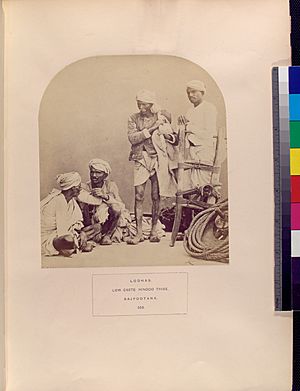Lodhi (caste) facts for kids
The Lodhi (also known as Lodha or Lodh) is a community of people in India who mainly work in agriculture. Most Lodhi live in the state of Madhya Pradesh. Their families originally moved there from Uttar Pradesh. The Indian government recognizes the Lodhi as an "Other Backward Class," which means they receive special support. However, many Lodhi prefer to be called "Lodhi-Rajput" because they believe they have historical connections to the Rajput warrior class, even though they don't have clear records or traditions to prove this link.
Contents
The Lodhi Community in India
The Lodhi community has a rich history and culture. They are known for their farming skills and their strong community bonds. Understanding their background helps us learn about the diverse groups that make up India.
What Does "Lodhi" Mean?
The name Lodhi has a few possible origins. Robert Vane Russell, a British official from the time of the British Raj (when Britain ruled India), suggested some ideas. One idea is that the name comes from lod, meaning "clod" (a lump of earth). Another theory links it to lodh, which is a type of tree. The bark of this tree was used by some Lodhi people in Northern India to make dye.
Russell also thought that Lodha was the original name. He believed it later changed to Lodhi in the Central Provinces of India. Another idea is that the name comes from the Ludhiana district in Punjab, suggesting it was the Lodhi homeland.
A Look at Lodhi History
The Lodhi community has been mentioned in historical records for centuries. These records help us understand their journey and how they became an important part of Indian society.
Early Mentions and Leaders
One of the earliest mentions of a Lodhi village chief, called a nagar chaudhari, is in a book called Vardhamana Purana. This book was written in the year Samvat 1825 (which is 1768 AD). It talks about a special event in Samvat 1651 (1594 AD). During this event, a temple in Bhelsi was officially opened. This temple was built when Jujhar Singh, a ruler from the Bundela kingdom, was in power. The temple still stands today.
Growing Influence Under British Rule
During the time of British rule, historical records described the Lodhi as people who moved from the United Provinces of Agra and Oudh. As they spread out, they gained more importance in society. Many Lodhi became landowners and local leaders. They were considered powerful, ranking just below groups like the Brahmin, Rajput, and Bania.
Some of these important Lodhi landowners earned the title of thakur. Certain Lodhi families in areas like Damoh and Sagar were even given titles such as raja (king), diwan (chief minister), and lambardar (village headman) by the Raja of Panna. These powerful Lodhi leaders played a key role in the 1842 Bundela rising, which was a significant local rebellion.
Lodhi Identity and Social Status
In the 20th century, the Lodhi community became more organized. They worked to define their identity and gain recognition for their place in society.
Stories of Origin and Identity
Members of the Lodhi community developed a special story about their origins. They claimed to have come from Kazakhstan. In this story, they were said to be the only surviving kshatriyas (a warrior class) after a legendary event where many warrior groups were said to have been removed from the earth by a powerful figure named Parashurama. This story helped them claim a royal heritage.
Organizing for Recognition
After the 1911 census, the Lodhi community started to organize politically. Before the 1921 census, they held a meeting in Fatehgarh. There, they officially claimed the name Lodhi-Rajput. In 1929, they formed a large organization called the Akhil Bharatiya Lodhi-Kshatriya (Rajput) Mahasabha. This organization helped them promote their identity and interests.
During the early 20th century, several books were published to support the Lodhi claims of being Rajput and Kshatriya. These included Maha Lodhi Vivechana in 1912 and Lodhi Rajput Itihas in 1936. These books helped share their historical claims and strengthen their community identity.
Famous People from the Lodhi Community
Many individuals from the Lodhi community have achieved great things and made a difference in society.
- Avanti Bai: She was a brave Lodhi queen from Ramgarh, which is now in Madhya Pradesh. She fought against the British in 1857 and is now a symbol of strength and inspiration for many people, especially those from marginalized communities.
- Kalyan Singh: An Indian politician and a member of the Bharatiya Janata Party (BJP). He served as the Chief Minister of Uttar Pradesh twice and was also a Member of Parliament.
- Rammurti Singh Verma: He was a former Member of the Uttar Pradesh Legislative Assembly.
- Uma Bharti: She served as the former Chief Minister of Madhya Pradesh.


